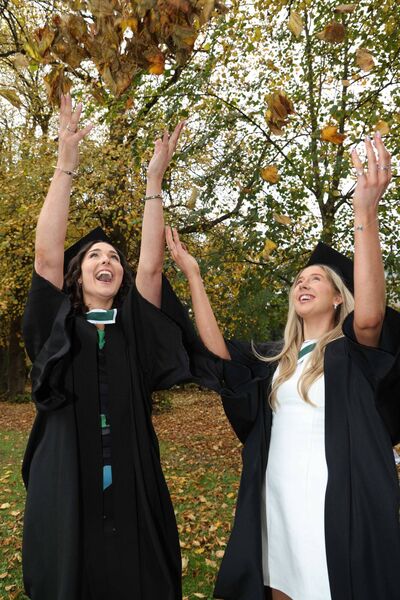It's the season to celebrate third-level success

Twins Stephen and Daniel Ferriter from Hollymount were conferred with an Honours Bachelor of Arts from University of Galway. Picture: Aengus McMahon
This is the time of year when people are graduating from their colleges and places of study. It is a joyous period, when newspapers such as this one are full of pictures and short reports of achievements. On various pages, you can see them: happy, smiling faces, knowing there are even prouder ones on the other side of the camera.
The day you get your scroll is a big and important day, a day to dress up and have a fancy lunch or dinner. Some see it as marking the end of a long slog, and it is, in a way, but it is also a beginning. That’s why in some colleges you will hear the graduation ceremonies referred to as a commencement, because they are the alpha, not the omega, the start, not the finish. Your graduation scroll says you have done this work and achieved this distinction, and now off you go and see what you can make of yourself with it. Securing an award is the accelerator for the engine that is your heart and mind working in tandem.
These days – and the way they are celebrated – are very west of Ireland. For many reasons, we have always been highly invested in further and higher education. The benefits of education have always been very well understood in this part of the world. We also understand the importance of marking occasions, properly, seriously, solemnly, and sometimes raucously, whether that be at a wedding, funeral, or a graduation.
It wasn’t always like that of course. It was once so rare for someone to graduate from a university that it only ever happened to the doctor’s son.
But around about the early to mid-1990s, that all changed. More and more people started to go to college and then on to graduate. A key reason was that as the economy started to improve, more families from this region had the means and the ambition to send their kids on to university. This mostly impacted what we might call the ‘newly prosperous’ in the west, many of whom had not themselves gone to college, but were determined that their kids would.
It wasn’t just that cohort of society though that benefitted. From the 1990s on, more and more people who had no family history of higher education and were also from family backgrounds with fewer advantages, started to go. That process was slower and is still a work in progress, but the change was starting to be noticeable even 30 years ago. It was linked to our upcoming membership of the EU’s Single Market, and the understanding that the industries who would flock here would need graduates to work in them.
The Regional Technical Colleges (RTCs) as they were then played a big part in that. The great thing about those colleges was that they were full of people with very little or no family history of third-level education. They were social mobility in bricks and mortar.
Throughout that period, they were built and expanded and they educated large numbers of students. The day you graduated from an RTC meant the chance of a better job, better pay, good terms and conditions, and then – the important bit – to have a good standard of living for you and your family. That transformed the picture for the country and this region. Getting a degree or qualification from an RTC and then a job in Baxter or Allergan was a way to not only live in the west, but to live well.
That was transformative for the individual but also for society: those are the industries that powered – and still power – the actual economy. That generates the money we all spend every day.
There was also a vital regional dimension to it. Bringing third-level education close to people is especially important when trying to encourage people from social backgrounds not traditionally associated with college to try it. For that reason, the name of Paddy McGuinness and his campaign for Castlebar RTC deserves to be remembered in the same way as Monsignor James Horan.

Now, in our time, that expansion of opportunity continues. The pathways to get into a degree programme have widened, with further education colleges and schools right across our region doing that vital work. Mature students are increasingly likely to attend college, to get their degree and to graduate. Nothing is more powerful than the story of someone graduating who didn’t get a chance to study when they were young because of some obstacle or bump in the road. For them - whatever age they are - the graduation ceremonies are a commencement too.
And as anyone who ever studied on a degree programme will tell you, mature students provide example, encouragement and inject good sense into any group of students. They add value to the learning for everyone because they have already done some living.
So, whatever the history, or what the family or personal story was, these weeks are occasions of great joy, as people get the formal recognition their work, toil and sacrifice has gained them.
If you are heading along to a graduation ceremony, you can observe – perhaps wryly – all the slightly strange ceremonial aspects of which they are made up. They are all symbolic of something: the gowns; the hats; the parchment. What they amount to is a recognition of achievement, of capability, and of readiness to go out into the world, learn more, and make a contribution.
Graduation Day is itself a big day in the life of any institution. Each college will have its own particular way of doing things. In University of Galway, the Irish language will play a big part. In my day, Trinity, with its history, made no compromises with the local vernacular - there was no way they were going to have the graduation day lessened by using common speech or the native tongue, so obviously every word spoken was in Latin.
However the graduation day for your family unfolds, enjoy it. People might think the day is purely to celebrate the person graduating, but of course it is also a day for those who have supported that person to achieve this distinction and get their recognition. They will also help the new graduate with their most important commencement decision: what do I do now? That, in a very real way, is the best kind of problem: the problem of success.




